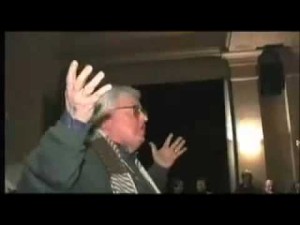I don’t think you need to be biologically of Asian-descent (or American, for that matter) to be an Asian American hero. Roger Ebert is one of my Asian American heroes, because he helped change the face of Asian American film after he famously responded to a (white) heckler during the Q&A after a screening of Justin Lin’s Better Luck Tomorrow at Sundance in 2002.
I can’t believe it has been over a decade since BLT shook up the Asian American film scene, but I remember hearing the stories coming back from Park City that year– specifically that Roger Ebert stood up and “had a few words to yell during the Q&A,” as my friend understated.
It started when white audience members criticized Justin Lin for portraying Asian Americans in a bad light, and it ended when Ebert stood up and had the final emphatic word– even after they tried to clear the theater– when he vehemently defended Asian American filmmakers in telling their own stories.
From a transcript at Film Threat:

Roger Ebert: I was on a panel today with Chris Eyre, the Native American director. And he said, that for a long time, his people, American Indians, had always had to play some kind of a function, like they were the source of spirituality, or the source of great wisdom and they spoke to the trees and the wind and so forth. And he wanted to make a movie that allowed Native Americans to be people. People in some cases who are alcoholics or who are vigilantes, or in prison (music interrupts) And what I find very offensive and condescending about your statement, is nobody would say to a bunch of white filmmakers, “How could you do this to your people?” ^ This film has the right to be about these people and Asian American characters have the right to be whoever the hell they want to be. They do not have to “represent” their people.
Until a few years ago, when I saw Arthur Dong’s documentary Hollywood Chinese, I had never seen video of Ebert’s “outburst” since it was neither widely available nor shareable. I can honestly say that watching the footage moved me to tears, because by the time I saw the clip, more than half a decade had passed since the incident had actually happened. And I knew what an impact that moment had on the Asian American artistic community.
One of my passions when it comes to Asian Americans is that we should all feel comfortable and confident to speak for ourselves as individuals. This is the reason I was drawn to 8Asians and why I continue to support fresh, distinct voices and opinions on this site, even when I sometimes personally disagree with what is being said, or even when different people here at 8Asians disagree with each other. One of the big complaints I hear is that Asian Americans don’t have ANY “one person” that can speak for our entire diverse community (like how African Americans have a Jesse Jackson, who doesn’t actually speak for all blacks, but many people both inside and outside of the African American community perceive him this way).
I think that none of us individually should have the burden to speak for “everyone.” We can only speak for ourselves in whatever we do, but if there aren’t enough voices– or in the case of the media, enough different portrayals of Asian Americans– the resulting vacuum gives rise to the fallacy that the voices of the few represent that of the many.
Roger Ebert’s defense of Asian American filmmakers didn’t just give support to Justin Lin and the BLT team for that specific work, but his noted reputation also gave more weight to the idea that any portrayal of Asian Americans does not have to stand for all Asian Americans, helping to inspire rising Asian American filmmakers and artists to tell stories which do not have to “represent” us all.
Rest in peace, Roger Ebert.







